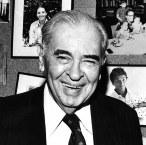Juiz de Fora, 1903 – Río de Janeiro (Brasil), 1984
By Flávio Aguiar
Declaring himself aware of his writing processes, he lived with his fellow countrymen Abgar Renault and Aníbal Machado, writers with whom he discussed literature when not dedicating himself to medicine. Since 1925, he had been contributing poems to the modernist publication A Revista. In 1946, he appeared in the anthology Poetas brasileiros bissextos contemporâneos organized by Manuel Bandeira. Only at the age of 65 did he begin writing the first of six volumes of memoirs that ensured him unanimous literary recognition.
Derived from scattered texts, Baú de ossos (1972) was received by critics as one of the founding books of the genre in Brazil, following Memórias do cárcere by Graciliano Ramos, and as a precursor to the testimonial novel, such as Em câmera lenta by Renato Tapajós. In 1974, he published the second volume, Balão cativo, for which he received the Machado de Assis Prize. In 1983, he published O círio perfeito, with which he concluded his memoirs. The other volumes are: Chão de ferro (1976); Beira-mar (1980); Galo-das-trevas (1981).



